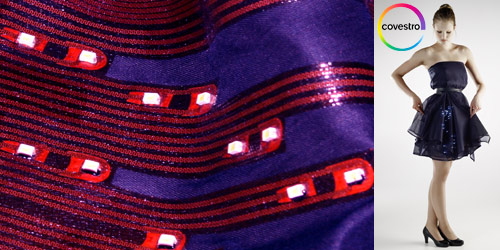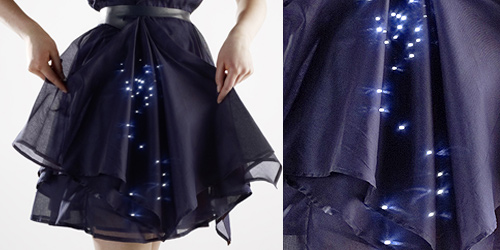
Covestro is showcasing an item of at the K 2016 plastics trade fair. LEDs make it truly stand out, but can also perform key functions such as protecting pedestrians and cyclists against accidents. What makes it special is that the light-emitting diodes are not positioned on a panel or strip, but on a piece of soft fabric.
At the center of the development is an electronic system that is responsive to movements without losing its functionality. The system comprises a flexible and formable film made of thermoplastic polyurethane (TPU) from Covestro. The TPU is the substrate for the printed copper circuits, which are arranged in a meandering pattern and can thus also be bent and stretched.
Intelligent technology
Smart circuits are manufactured using an efficient, multi-stage process. First, copper films are laminated onto the polyurethane films. The printed circuits are produced in a subsequent structuring operation featuring highly effective adhesion. The coated films are then shaped as required using conventional thermoforming.
“The films are resistant to standard etching and imaging processes,” said Covestro film expert Wolfgang Stenbeck. “Formable electronic systems can also be directly laminated onto textiles, as in the case of the luminous dress.”
The production technology was developed as part of various projects funded by the EU Commission, among them STELLA and TERASEL. The objective is to produce 2.5-dimensional electronic circuits cost-effectively using conventional forming processes. The freely formed components can be integrated seamlessly into energy-efficient electronic components. They can be processed using standard PCB industry equipment and are also suitable for applications with higher currents or voltages.
The smart circuits meet a whole range of other customer needs and are thus ideal for applications in a variety of industries. Compared to conventional electronic components, they offer greater design freedom and reliability while enabling more sustainable products due to the reduced use of materials.
 From functional underwear to automotive interiors
From functional underwear to automotive interiors
The technology opens up an extremely wide range of options for smart textiles alone. Besides fashion items such as the luminous dress, freely formable electronic systems are already in use in underwear, where they monitor heart rate and breathing. They assist patients with therapy and help athletes monitor their training.
TERASEL technology also enables production of modular automotive interior components in which all functions are already integrated. This reduces complexity in assembly, cuts costs and shortens time to market. It also clears the way for new lighting concepts in automotive interiors and buildings, where designers and architects can position LEDs exactly where they are needed most.
In consumer electronics, smart circuits are supporting the trend toward increased miniaturization of components, as they can be incorporated directly into the outer shell of products.
Stretchable circuit board (SCB) technology for manufacturing stretchable electronic circuits was developed earlier as part of the European STELLA project. This was led by the Fraunhofer Institute for Reliability and Microintegration (IZM) and the Technical University of Berlin. Coated TPU films can be stretched repeatedly up to 60 percent, and on a one-time basis by as much as 300 percent.
Visit the company at the K 2016 plastics trade fair from October 19 to 26 in Düsseldorf, Germany, Hall 6, Stand A 75. Find more information at http://www.k2016.covestro.com/.
About Covestro:
With 2015 sales of EUR 12.1 billion, Covestro is among the world’s largest polymer companies. Business activities are focused on the manufacture of high-tech polymer materials and the development of innovative solutions for products used in many areas of daily life. The main segments served are the automotive, electrical and electronics, construction and the sports and leisure industries. Covestro, formerly Bayer MaterialScience, has 30 production sites around the globe and as of the end of 2015 employed approximately 15,800 people (full-time equivalents).

